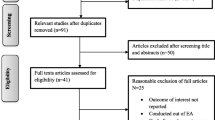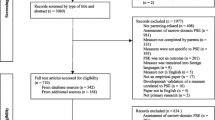Abstract
Background
Breastfeeding rates in Ireland are among the lowest worldwide. A feasibility study of a breastfeeding-support intervention explored maternal characteristics associated with antenatal breastfeeding self-efficacy and with infant-feeding mode at 6 weeks postpartum among women giving birth in Ireland.
Methods
We conducted a prospective study across two sites, urban and rural: The National Maternity Hospital (NMH), Dublin and Wexford General Hospital (WGH), Wexford. Nulliparous, pregnant women were recruited at approximately 32 weeks gestation from the hospitals’ antenatal out-patient departments. Participants attended an antenatal class with a support partner, received a one-to-one session with a lactation consultant after delivery and had access to a breastfeeding-support clinic and telephone advice postpartum. Our aim was to understand maternal variables associated with breastfeeding self-efficacy and infant-feeding mode. We explored associations between continuous and categorical variables and any breastfeeding and exclusive breastfeeding using t tests and Chi-squared analyses.
Results
One hundred mothers provided baseline data; 64 provided follow-up data. Lower maternal age and non-Irish nationality were associated with higher antenatal breastfeeding self-efficacy. At the rural unit, mothers with tertiary education were more likely to be exclusively breastfeeding than those with secondary education. Though not statistically significant, more normal-weight mothers from the urban unit were exclusively breastfeeding at 6 weeks than overweight/obese mothers.
Conclusions
Breastfeeding outcomes differed by maternal education. Future interventions should target mothers with lower education and possibly also overweight and obese mothers. Increasing breastfeeding self-efficacy, particularly among older and Irish-born mothers, may be a mechanism for improving breastfeeding outcomes.


Similar content being viewed by others
References
Health Service Executive (2016) Breastfeeding in a Healthy Ireland Health Service Breastfeeding Action Plan 2016-2021. Dublin, Ireland
World Health Organization (2001) The optimal duration of exclusive breastfeeding: report of an expert consultation. http://www.who.int/nutrition/publications/infantfeeding/WHO_NHD_01.09/en/
Gallagher L, Begley C, Clarke M (2016) Determinants of breastfeeding initiation in Ireland. Ir J Med Sci 185(3):663–668
World Health Organization (2017) European Health Information Gateway: % of infants breastfed at age 3 months. Available at https://gateway.euro.who.int/en/indicators/hfa-indicators/hfa_615-7250-of-infants-breastfed-at-age-3-months/. Accessed 3rd July 2017
Dieterich CM, Felice JP, O’Sullivan E, Rasmussen KM (2013) Breastfeeding and health outcomes for the mother-infant dyad. Pediatr Clin N Am 60(1):31–48
Dennis C-L, Faux S (1999) Development and psychometric testing of the breastfeeding self-efficacy scale. Res Nurs Health 22(5):399–409
Blyth R, Creedy DK, Dennis CL, Moyle W, Pratt J, De Vries SM (2002) Effect of maternal confidence on breastfeeding duration: an application of breastfeeding self-efficacy theory. Birth 29(4):278–284
Brockway M, Benzies K, Hayden KA (2017) Interventions to improve breastfeeding self-efficacy and resultant breastfeeding rates: a systematic review and meta-analysis. J Hum Lact 33(3):486–499
Tarrant RC, Younger KM, Sheridan-Pereira M, Kearney JM (Aug 2011) Factors associated with duration of breastfeeding in Ireland: potential areas for improvement. J Hum Lact 27(3):262–271
Cullen P (2017) Breastfeeding rates vary hugely between urban and rural areas. The Irish Times. Friday, 28th July 2017
Scott J, Colin W (2002) Breastfeeding: reasons for starting, reasons for stopping and problems along the way. Breastfeeding Review 10(2):13
Kirkland VL, Fein SB (2003) Characterizing reasons for breastfeeding cessation through out the first year postpartum using the construct of thriving. J Hum Lact 19(3):278–285
Li R, Fein SB, Chen J, Grummer-Strawn LM (2008) Why mothers stop breastfeeding: mothers’ self-reported reasons for stopping during the first year. Pediatrics 122(Supplement 2):S69–S76
Hauck YL, Fenwick J, Dhaliwal SS, Butt J (2011) A western Australian survey of breastfeeding initiation, prevalence and early cessation patterns. Matern Child Health J 15(2):260–268
Layte R, McCrory C (2014) Growing Up in Ireland. National Longitudinal Study in Children. Maternal Health Behaviours and Child Growth in Infancy. Analyses of the Infant Cohort of the Growing Up in Ireland study. Dublin: Department of Children and Youth Affairs
Gallagher L, Clarke M, Cochrane U, Carroll M, Millar S (2008) The National Infant Feeding Survey
Bennett AE, McCartney D, Kearney JM (2016) Views of fathers in Ireland on the experience and challenges of having a breast-feeding partner. Midwifery 40:169–176
Alberdi G, O’Sullivan EJ, Scully H, Kelly N, Kincaid R, Murtagh R, Murray S, McGuinness D, Clive A, Brosnan M, Sheehy L, Dunn E, McAuliffe FM (2018) A feasibility study of a multidimensional breastfeeding-support intervention in Ireland. Midwifery 58:86–92
Brick A, Nolan A (2014) Explaining the increase in breastfeeding at hospital discharge in Ireland, 2004–2010. Ir J Med Sci (1971-) 183(3):333–339
Ladewig EL, Hayes C, Browne J, Layte R, Reulbach U (2013) The influence of ethnicity on breastfeeding rates in Ireland: a cross-sectional study. J Epidemiol Community Health.jech-2013-202735
Dennis CLE (2006) Identifying predictors of breastfeeding self-efficacy in the immediate postpartum period. Res Nurs Health 29(4):256–268
Newby R, Brodribb W, Ware RS, Davies PS (2015) Internet use by first-time mothers for infant feeding support. J Hum Lact 31(3):416–424
Moore AP, Milligan P, Rivas C, Goff LM (2012) Sources of weaning advice, comparisons between formal and informal advice, and associations with weaning timing in a survey of UK first-time mothers. Public Health Nutr 15(9):1661–1669
O’Sullivan EJ, Perrine CG, Rasmussen KM (2015) Early breastfeeding problems mediate the negative association between maternal obesity and exclusive breastfeeding at 1 and 2 months postpartum. J Nutr 145(10):2369–2378
Rasmussen KM, Kjolhede CL (2004) Prepregnant overweight and obesity diminish the prolactin response to suckling in the first week postpartum. Pediatrics 113(5):e465–e471
Nommsen-Rivers LA (2016) Does insulin explain the relation between maternal obesity and poor lactation outcomes? An overview of the literature. Adv Nutr 7(2):407–414
Leeming D, Marshall J, Locke A (2017) Understanding process and context in breastfeeding support interventions: the potential of qualitative research. Matern Child Nutr 13(4):e12407
Noel-Weiss J, Rupp A, Cragg B, Bassett V, Woodend AK (2006) Randomized controlled trial to determine effects of prenatal breastfeeding workshop on maternal breastfeeding self-efficacy and breastfeeding duration. J Obstet Gynecol Neonatal Nurs 35(5):616–624
Leahy-Warren P, Mulcahy H, Phelan A, Corcoran P (2014) Factors influencing initiation and duration of breast feeding in Ireland. Midwifery 30(3):345–352
Acknowledgements
The authors gratefully acknowledge the women and their support partners who volunteered their time to participate in this study.
Funding
This project was funded by the Health Service Executive Nursing and Midwifery Planning and Development Unit, Dublin North East.
Author information
Authors and Affiliations
Corresponding author
Ethics declarations
Conflicts of interest
The authors declare that they have no conflict of interest.
Ethical approval
This study received ethical approval from the Research Ethics Committee of NMH (Dublin, Ireland) and the Research Ethics Committee of the Health Service Executive South-Eastern Area (Dublin, Ireland). All procedures performed were in accordance with the ethical standards of the research committees and with the 1964 Helsinki declaration and its later amendments or comparable ethical standards.
Informed consent
Informed consent was obtained from all individual participants included in the study.
Rights and permissions
About this article
Cite this article
O’Sullivan, E.J., Alberdi, G., Scully, H. et al. Antenatal breastfeeding self-efficacy and breastfeeding outcomes among mothers participating in a feasibility breastfeeding-support intervention. Ir J Med Sci 188, 569–578 (2019). https://doi.org/10.1007/s11845-018-1884-0
Received:
Accepted:
Published:
Issue Date:
DOI: https://doi.org/10.1007/s11845-018-1884-0




